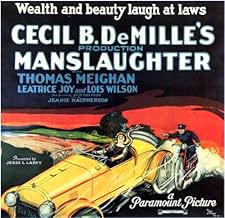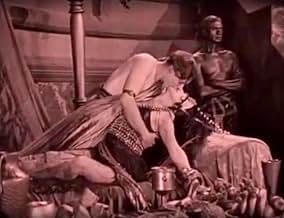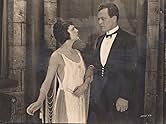Thrill-seeking society girl Lydia causes a motorcycle policeman's death and is prosecuted by her fiancé Daniel, who describes in lurid detail the downfall of Rome. While she's in prison, she... Read allThrill-seeking society girl Lydia causes a motorcycle policeman's death and is prosecuted by her fiancé Daniel, who describes in lurid detail the downfall of Rome. While she's in prison, she reforms and Daniel becomes a wasted alcoholic.Thrill-seeking society girl Lydia causes a motorcycle policeman's death and is prosecuted by her fiancé Daniel, who describes in lurid detail the downfall of Rome. While she's in prison, she reforms and Daniel becomes a wasted alcoholic.
- Director
- Writers
- Stars
- Awards
- 1 win total
- Dicky Evans
- (as Mickey Moore)
- Director
- Writers
- All cast & crew
- Production, box office & more at IMDbPro
Featured reviews
There are the usual Demille scenes of people having a great time getting drunk in wild costumes, and even worse, dancing; later, during Meighan's summing up, there's a flashback sequence in which barbarians in hairy vests and winged helmets break into where the Vestal Virgins are sleeping one off. Finally, there's redemption for the ladies in vague homilies and multi-denominational Christianity. Meanwhile, Meighan has been been going through his own spiral, thanks to the demon rum, but there's hope even for him, in the love of a good woman.
My vague and sarcastic gassing is not intended to put down this version, so much as to be entertaining while giving away as little as possible to those who have not seen this movie. Let's be honest: there are some people whose opinion is worthwhile, who claim this is the worst movie Demille ever made. I can see why. It's at the end of his cavort-for-six-reels-and-repent-in-the-seventh phase, and the public was growing a tad tired of them by this point. I don't think it's worse than any of the others. In fact, I think it rather typical. Had public tastes not changed, he would have kept on making them.
No, if there are issues, it's that remaining with the same format meant Demille's evolution from one movie to the next had to be incremental rather than revolutionary. Also, I don't think Miss Joy brings much to the part that a more skilled comedienne might have. However, Bebe Daniels was off doing comedies for another division of Paramount, and Gloria Swanson likewise. Contrariwise, Meighan is fine, and Miss Wilson, while poorly served, doesn't let the side down. The result is an entertaining movie that if not the overwhelming success that Demille had grown used to by this point, is certainly worth your time.
The story, of a shallow fun-loving rich girl discovering that the true meaning of life is service to others, is rather too moral to be taken seriously - especially as DeMille can't help creating two completely gratuitous, but highly enjoyable, "flash-backs" to Ancient Rome, featuring wild orgies (and even a lesbian kiss!!). It's the usual clash between DeMille's fascination with sex and sado-masochism and his need to moralise against such things.
It all adds up to a visually stunning entertainment. Don't miss it!
As one intertitle says early on: "Modern girls don't sit by the fire and KNIT." And so the leading character, played with great verve by Leatrice Joy (unknown to me), races, literally, to a huge dilemma. A man is killed, and a district attorney falls in love with the wrong woman. There are parties, and some hugely extravagant (for the time) scenes that director DeMille loved to stage. It's all kind of fun and the drama relatively dramatic. But none of it rises above. The conflicts are a bit drained of actual tension (partly the acting, partly the script) and the overall flow is surprisingly slow. The fun parts sometimes seem like interludes that may have once held their own, but no longer (and maybe not then, either).
I expected more, which is always a problem, but if you want to get into early DeMille, before he turned into a blockbuster hack, there are at least 10 other films I've seen (actually) that are much better. (Look for almost any drama between 1918 and 1921, a really fertile period for him and his loyal cinematographer, Alvin Wycoff.) As for the title, there might have been a great double entendré there, with both the man killed and the man in love, but it never quite gels.
Other powerful means were also available to early cinema: just think of close-ups, or the expression of a face... Similar cinematic tricks were not possible in the theatre: they were some of the tools of cinema as a new means of expression, or - in rare cases - art.
Among the filmmakers, some realized it earlier, some later...
Did you know
- TriviaIn order to correctly write a script that would depict the experience of a woman being arrested and imprisoned, screenwriter Jeanie Macpherson arranged, at Cecil B. DeMille's behest, to be imprisoned for stealing a fur piece from a friend (with whom she had worked out an agreement beforehand). She was arrested in Detroit, booked and fingerprinted under the name Angie Brown and spent three days in jail before a police official discovered the truth and arranged for her release. Macpherson wrote about the experience in an article called I Have Been in Hell.
- Quotes
Lydia's Chaperon: Make Dan keep an eye on her, Eleanor. If she will show up for anybody, she will for him - but as her chaperon, I won't stay and be party to such goings on!
- ConnectionsFeatured in The Love Goddesses (1965)
Details
Box office
- Budget
- $385,000 (estimated)
- Runtime
- 1h 40m(100 min)
- Color
- Sound mix
- Aspect ratio
- 1.33 : 1







































